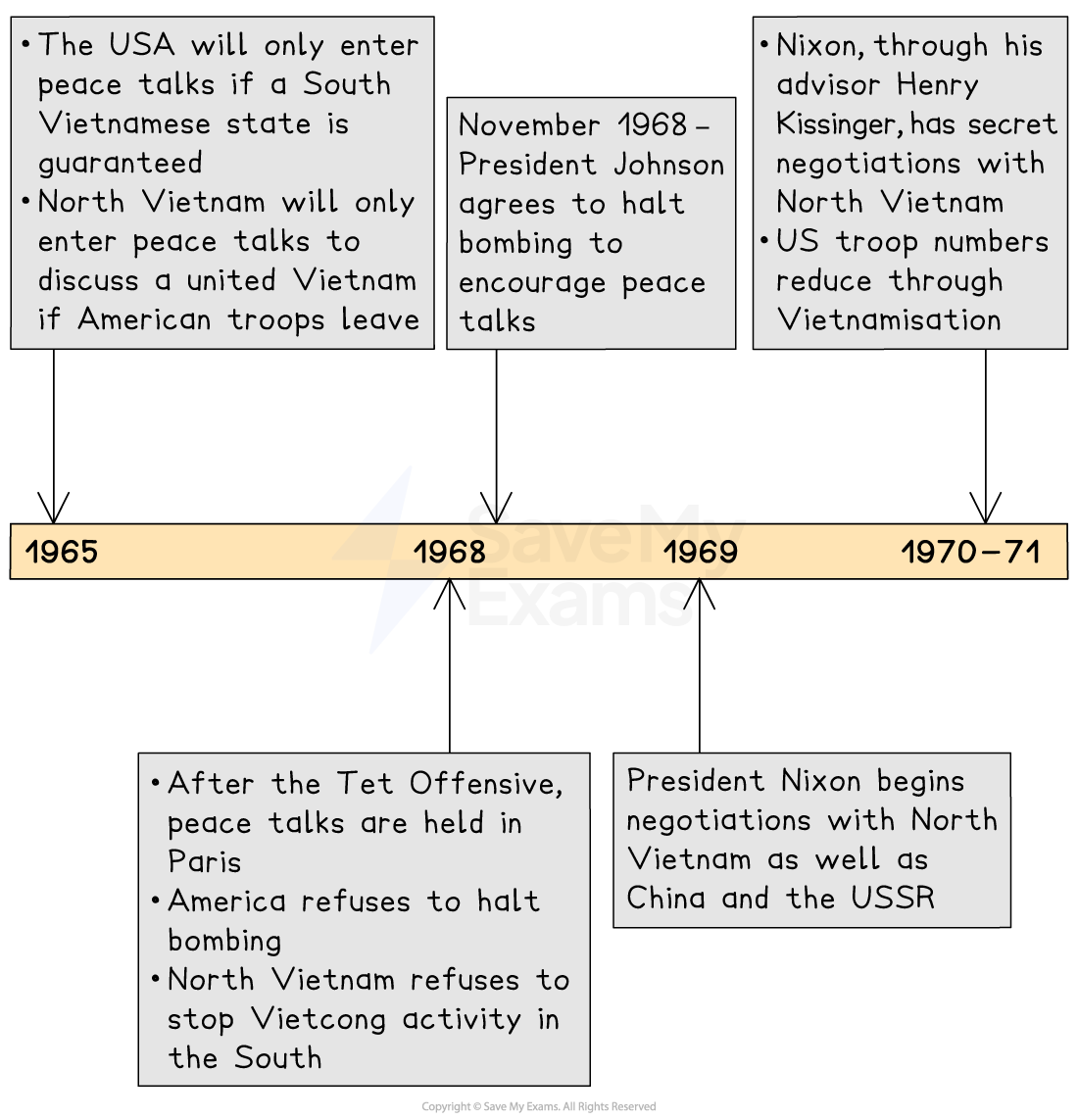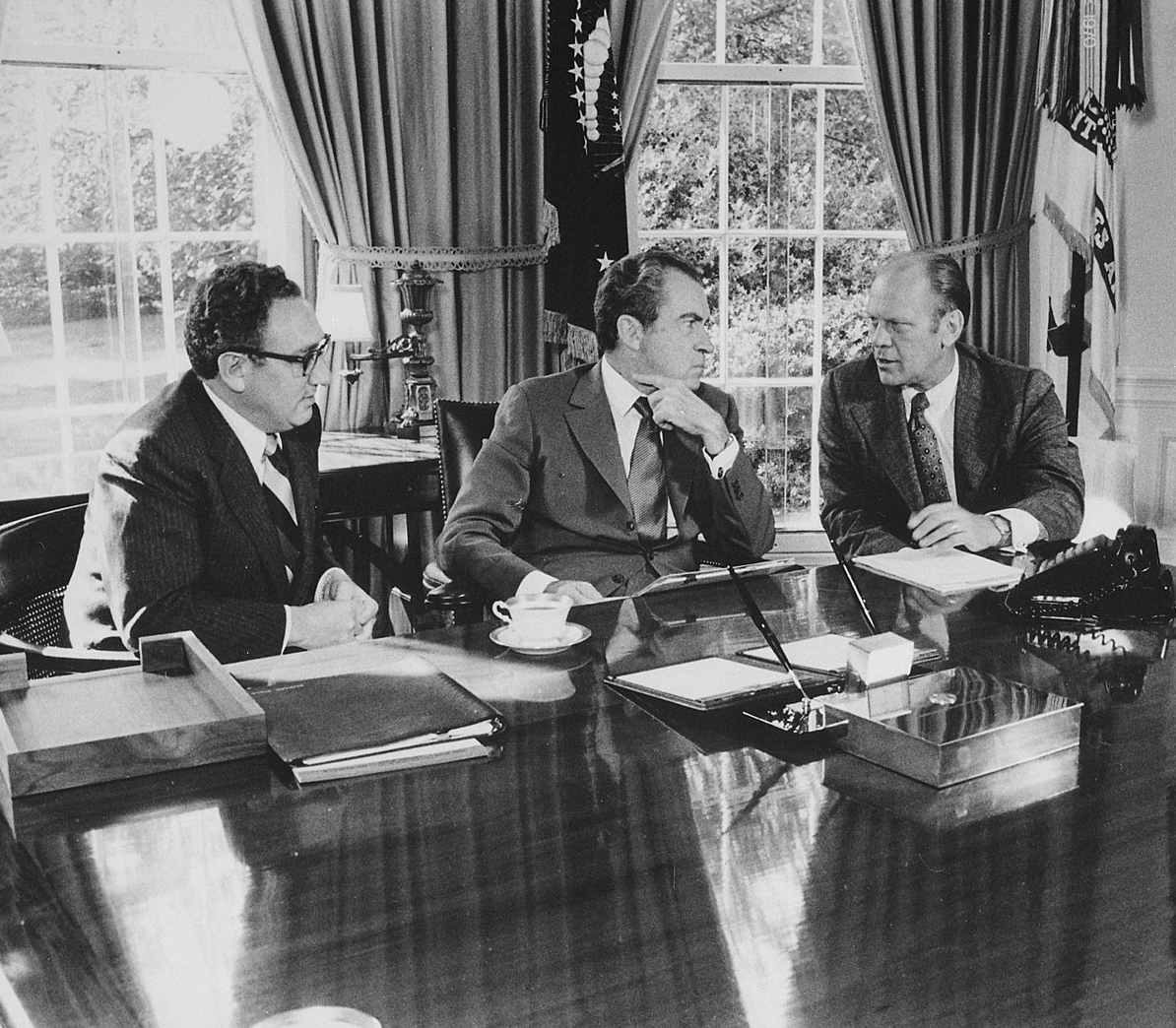The Peace Process to End the Vietnam War (Edexcel GCSE History): Revision Note
Exam code: 1HI0
Summary
There had been calls for a negotiated peace to the Vietnam War from the very start. However, both sides had demanded that the other side found unacceptable meaning no progress was ever made. By 1972, the situation had changed for both sides and they sat down in France and agreed to the Paris Accords in 1972. This led to American troops leaving Vietnamese soil. It also led to the invasion of South Vietnam by North Vietnam and the final unification of the nation.
Vietnam War Peace Negotiations by 1972
There had been calls for peace negotiations since 1965 but these had all failed to make any progress
The reasons for the lack of progress include:
North Vietnam refusing peace talks until American troops leave
America refusing to stop bombing
North Vietnam refusing to stop Vietcong activity

Reasons for negotiation about the Vietnam War, 1972-1973
In October 1972, the two sides finally reached an agreement and signed the Paris Peace Accords early in the following year
There were several reasons why the two sides were motivated to reach an agreement in 1972
American reasons for negotiating
President Richard Nixon had been voted in to bring about ‘peace with honour’
Congress had started to restrict funding available to fight the war
Protests were erupting all over American college campuses
The US feared the Army of the Republic of Vietnam (ARVN) were weak and ineffective fighters
North Vietnamese reasons for negotiating
The heavy bombing campaigns of Operation Linebacker and Operation Linebacker II in 1972 inflict enormous casualties and damage
The Easter Offensive launched by the Vietcong failed to overthrow the South Vietnam government and North Vietnam feared the war might continue for years to come
China and the USSR began to pressure North Vietnam into negotiating.

What was agreed at the Paris Peace Accords?
The Paris Peace Accords of 1973, agreed to:
An immediate ceasefire
The withdrawal of American troops, and advisors and the closure of US military bases
The withdrawal of troops from Laos and Cambodia
The USA would provide funds to Vietnam, Cambodia and Laos to recover from the war
The reunification of Vietnam without any foreign nations interfering in the process
The significance of the Paris Peace Accords
The Paris Peace Accords were significant for several reasons:
They led to America being able to withdraw its troops from Vietnam whilst being able to claim they had not been defeated
They led to the South Vietnamese economy crashing as it no longer benefitted from American funding
Poverty and unemployment made the South Vietnam government even more unpopular
When North Vietnam grew with the South Vietnamese government for failing to talk, fighting resumed in late 1974
The Vietcong and North Vietnamese troops were welcomed by many in the South and the ARVN could not prevent the invasion
With American troops now out of Vietnam, Congress was unwilling to send them back to protect the South
In April 1975, Saigon fell to North Vietnamese forces and Vietnam became a united, communist nation
The American public’s reaction to returning veterans of the Vietnam War
The men who risked their lives fighting for America in Vietnam often received abuse and hostility rather than respect and gratitude when they returned home
Events such as the My Lai massacre led to them being called ‘baby killers’ and even being physically attacked
Many Vietnam veterans reported feeling like outcasts and found it difficult to find work
International consequences of the Vietnam War
America’s reputation as the ‘leader of the free world’ was badly damaged by the Vietnam War
Involvement in the war had come at an enormous cost
$168 billion spent
58,000 US soldiers killed
300,000 US soldiers injured
850,000 US soldiers suffering from severe mental trauma
Despite paying such a heavy price in both human lives and funds, the war had utterly failed and Vietnam, Laos and Cambodia became communist nations
The experience of Vietnam made America extremely reluctant to intervene in any other foreign conflicts around the world

Unlock more, it's free!
Was this revision note helpful?
